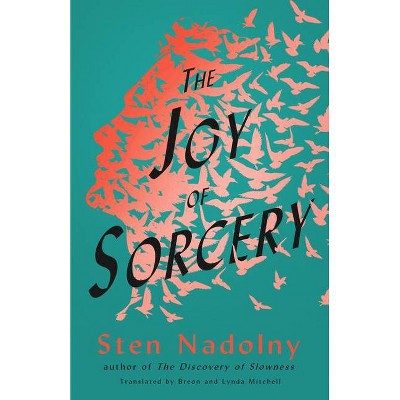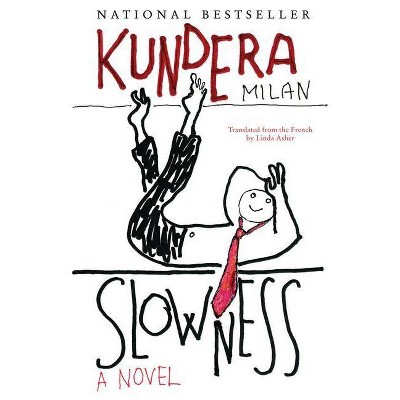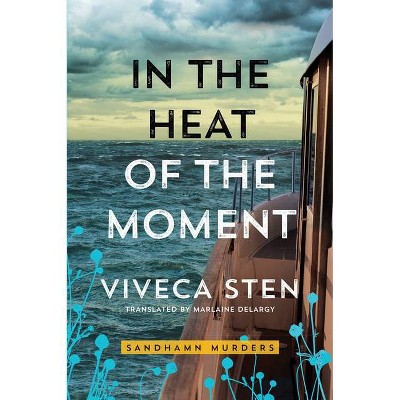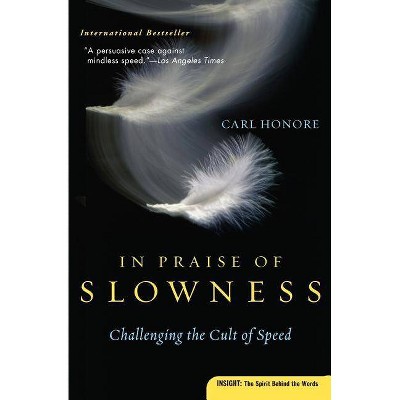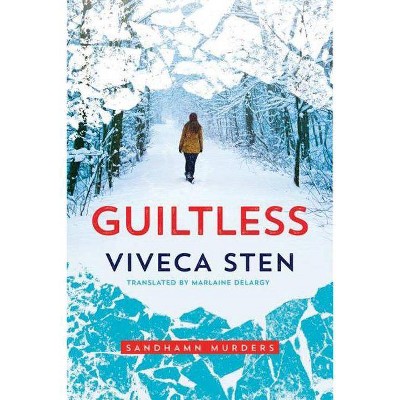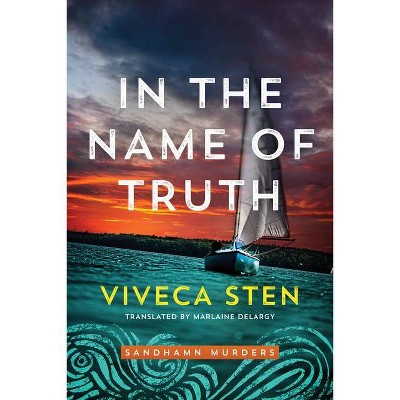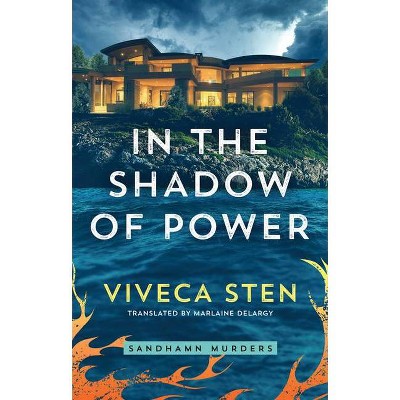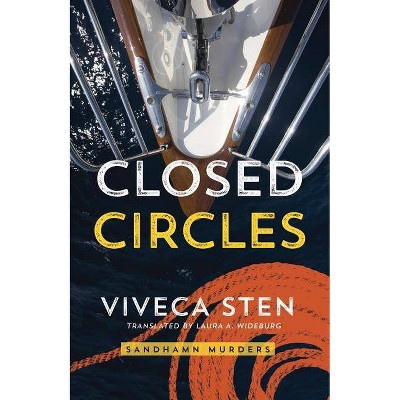The Discovery of Slowness - by Sten Nadolny (Paperback)
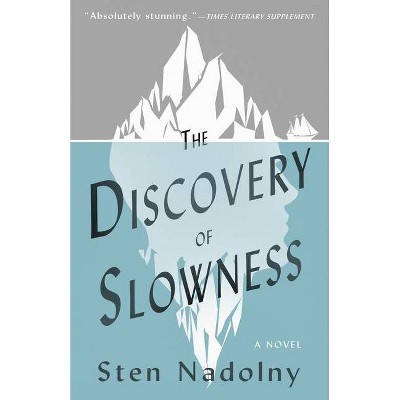
Similar Products
Products of same category from the store
AllProduct info
<p/><br></br><p><b> About the Book </b></p></br></br>Vivid and constantly surprising...excels at conveying the feel of discovery.--Washington Post<br><p/><br></br><p><b> Book Synopsis </b></p></br></br><p><b>Absolutely stunning.--<i>Times Literary Supplement</i></b></p><p>[<i>The Discovery of Slowness</i>] is about a guy who is so incredibly slow in his perception that he . . . actually sees shadows moving. [T]he amazing thing that I remember from reading that book is, whenever I looked up from that book, I felt I had this view from the book in my real world. This book made my life more interesting.--Christoph Niemann (as described in the Netflix series <i>Abstract: The Art of Design</i>)</p><p>This remarkable, superbly translated novel derives from the life of the real 19th century explorer John Franklin...[whose] adventures are conveyed with spellbinding skill.--<i>Publishers Weekly</i></p><p><i>The Discovery of Slowness</i>--a huge commercial and critical success across Europe, where it is considered the popular author's masterpiece--recounts the life of the nineteenth-century British explorer Sir John Franklin (1786-1847).</p><p>Through the author's acute reading of history and his marvelous storytelling prowess, the reader follows John Franklin's development from awkward schoolboy and ridiculed teenager to expedition leader, governor of Tasmania, and icon of adventure. Slow and deliberate from boyhood, Franklin appeared destined to be a misfit. But he escaped from the ever-expanding world of industry and Empire to the sea's silent landscape, where the universe seemed more manageable. At age fourteen he joined the navy. After surviving the harrowing battles of Copenhagen and Trafalgar, he embarked on several voyages of discovery into the Canadian North, and served as governor of Van Diemen's Land (now Tasmania). Everyone with whom he came into contact sensed that Franklin was a rare man, one who was "out of his time" and who moved to a different, grander beat. That beat eventually led Franklin to sail once more--on his final, fateful voyage--into the Arctic in search of the Northwest Passage.</p><p><i>The Discovery of Slowness</i> is a riveting account of a remarkable and varied life. And it is also a profound and thought-provoking meditation on time. The result is an unforgettable and deeply moving reading experience that justifies the novel's reputation as one of the classics of contemporary world literature.</p><p>***</p><p>Nadolny evinces remarkable empathy with his unlikely Odysseus and Ralph Freedman's translation captures the crystalline freshness of the author's imagery.--<i>Washington Post Book World</i></p><p><i>The Discovery of Slowness</i> is a masterpiece of characterization, a portrait of inwardness in the most outward-thrusting of lives.--<i>The New Republic</i></p><p>Fluid and suspenseful, a thought-provoking reminder of contemporary society's tendency to speed through everyday life.--<i>The Providence Journal-Bulletin</i></p><p>Amazing...His book is a historical painting, a seafarer's novel, a love story, an outcast's story all in one. This variety appears very harmonious, just as it incidentally, almost secretly, reflects on our right to discover the world at our own, personal pace.--<i>Frankfurter Allegemeine Zeitung</i></p><p>Sir John Franklin is the embodied contrast to the frenetic agitation of the modern world. The discovery of slowness is the slowness of discovery.--<i>New York Review of Books</i></p><p>Nadolny's vision is conveyed with restraint and charm...He has written a Utopia of character.--<i>New York Times Book Review</i></p><p>Its appeal lies in its observation of the texture of life, seen by a character who has to work everything out from first principles. It needs to be read slowly, to be absorbed as much as understood.--<i>Scotland On Sunday</i></p><p>This is more than an adventure; it's a meditation on time and perception...Not to be rushed, or forgotten.--<i>The Herald</i></p><p>Nadolny brilliantly sets the narrative pace to the rhythms of the frozen landscape, and to the 'slowness which is bred by hunger.'--Robert MacFarlane</p><p>This is both a wonderful historical novel and a spell-binding individual portrait...This is a marvellous translation of a masterly work.--<i>The Observer</i></p><p>Sten Nadolny (b. 1942) was an historian and filmmaker, before writing four novels and two collections of essays. He lives in Berlin and has been awarded four prizes: Ingeborg Bachmann (1981), Hans-Fallada (1985), Premio Vallombrosa (1986), Ernst Hoferichter (1995). <i>The Discovery of Slowness</i> (1983) has been translated into all major languages.</p><br><p/><br></br><p><b> Review Quotes </b></p></br></br><br><p><b>Praise for Sten Nadolny and <i>The Discovery of Slowness</i></b></p><p>Absolutely stunning.--<b><i>Times Literary Supplement</i></b></p><p>This remarkable, superbly translated novel derives from the life of the real 19th century explorer John Franklin...[whose] adventures are conveyed with spellbinding skill.--<b><i>Publishers Weekly</i></b></p><p>Nadolny evinces remarkable empathy with his unlikely Odysseus and Ralph Freedman's translation captures the crystalline freshness of the author's imagery.--<b><i>Washington Post Book World</i></b></p><p><i>The Discovery of Slowness</i> is a masterpiece of characterization, a portrait of inwardness in the most outward-thrusting of lives.--<b><i>The New Republic</i></b></p><p>Fluid and suspenseful, a thought-provoking reminder of contemporary society's tendency to speed through everyday life.--<b><i>The Providence Journal-Bulletin</i></b></p><p>Amazing...His book is a historical painting, a seafarer's novel, a love story, an outcast's story all in one. This variety appears very harmonious, just as it incidentally, almost secretly, reflects on our right to discover the world at our own, personal pace.--<b><i>Frankfurter Allegemeine Zeitung</i></b></p><p>Sir John Franklin is the embodied contrast to the frenetic agitation of the modern world. The discovery of slowness is the slowness of discovery.--<b><i>New York Review of Books</i></b></p><p>Nadolny's vision is conveyed with restraint and charm...He has written a Utopia of character.--<b><i>New York Times Book Review</i></b></p><p>Its appeal lies in its observation of the texture of life, seen by a character who has to work everything out from first principles. It needs to be read slowly, to be absorbed as much as understood.--<b><i>Scotland On Sunday</i></b></p><p>This is more than an adventure; it's a meditation on time and perception...Not to be rushed, or forgotten.--<b><i>The Herald</i></b></p><p>Nadolny brilliantly sets the narrative pace to the rhythms of the frozen landscape, and to the 'slowness which is bred by hunger.'--<b>Robert MacFarlane</b></p><p>This is both a wonderful historical novel and a spell-binding individual portrait...This is a marvellous translation of a masterly work.--<b><i>The Observer</i></b></p><br><p/><br></br><p><b> About the Author </b></p></br></br>Sten Nadolny has been an historian and filmmaker in addition to having written four novels and two collections of essays. His books have garnered numerous prizes--the first was awarded to him based on just the opening chapter of <i>The Discovery of Slowness</i>. He now lives in Berlin.
Price History
Cheapest price in the interval: 18.99 on October 22, 2021
Most expensive price in the interval: 18.99 on December 20, 2021
Price Archive shows prices from various stores, lets you see history and find the cheapest. There is no actual sale on the website. For all support, inquiry and suggestion messagescommunication@pricearchive.us
